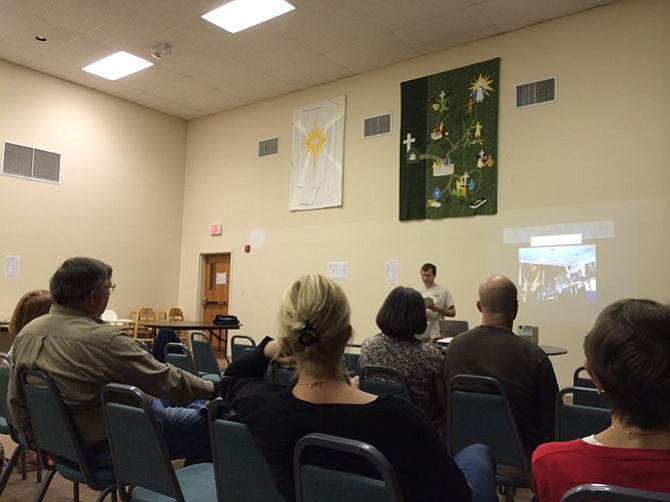At the Burke Historical Society's monthly meeting on Sept. 27, Brian Slawski gave a presentation about jazz venues and educational institutions that continuously promote music and its culture. Photo by Arisa Ishita/The Connection
How many people know that Burke is named after the 19th-century farmer, merchant and local politician, Silas Burke? What about this: how many people know that 1852 was the year when Burke received its first post office branch?
These are some of the questions the Burke Historical Society asks and gets people excited about learning Burke’s history.
The Burke Historical Society, a 501(c)3 tax-exempt organization, was established in 1978 to “preserve the area’s history – history of its people, its places and its personalities,” Jon Vrana, president of the society, wrote in the welcome letter on the website.
Part of the society’s mission is “to foster education, understanding and appreciation of Burke’s important role in history.” To accomplish their goal, the society prepares programs that help members learn about a variety of historical and cultural topics by inviting speakers and having them present their research.
AT THE MOST RECENT monthly meeting of Burke Historical Society, Brian Slawski, a utility patent examiner and the society’s programs chair, gave a presentation on “the history of the infrastructure of the local jazz scene” around the Burke area. He introduced jazz performance venues, festivals and educational institutions around the Washington, D.C., Alexandria and Fairfax areas, many of them promoting jazz music for decades.
“As a non-musician but a casual fan of jazz,” Slawski wrote in an email. “I was inspired to start looking into local connections to the music by the Society’s 2013 Christmas party, with its Roaring ‘20s/Jazz Age theme.”
In his previous presentation in July, he said he mainly covered jazz musicians, as well as promoters with ties to Northern Virginia and Washington, D.C.
Among the many jazz venues introduced, Laporta’s Restaurant, the Carlyle Club and Epicure Café are some of the recommended places around the area.
Laporta’s Restaurant, located on Duke Street in Alexandria, provides local jazz performances by various artists every day. The Carlyle Club, also in Alexandria, is the place not only for delicious meals and music, but also for other types of entertainment, such as birthday parties and weddings. Then Epicure Café, a family-run café opened in 2010 in Fairfax, emphasizes “love and appreciation for the arts,” according to its website.
“Epicure Café is a little gem,” said Sarah Foote, one of the performers at the café. “It has fun events going on every night of the week and routinely hosts local bands. It appeals to all ages.”
THE BURKE HISTORICAL SOCIETY believes there is always something to learn whether it is about history itself, culture, arts or people.
“What I like most about the BHS is the breadth of curiosity among the members for all aspects of local history,” Slawski said. “This means that I can arrange programs that are all over the map in terms of the subject and the historical period, and I can still count on an enthusiastic response.”
For those who are interested in the Burke Historical Society and what they do, come join them for the event on Oct. 10, Burke History Day. The event takes place in Old Town Burke, at the Burke Volunteer Fire and Rescue Department. This is a an opportunity to explore the history of transportation and railroads in Burke and more. This year, highlights include a film screening at the black box theater. The event is free and open to the public.
For more information about the Burke Historical Society and its upcoming events, visit http://www.burkehistoricalsociety.org.
